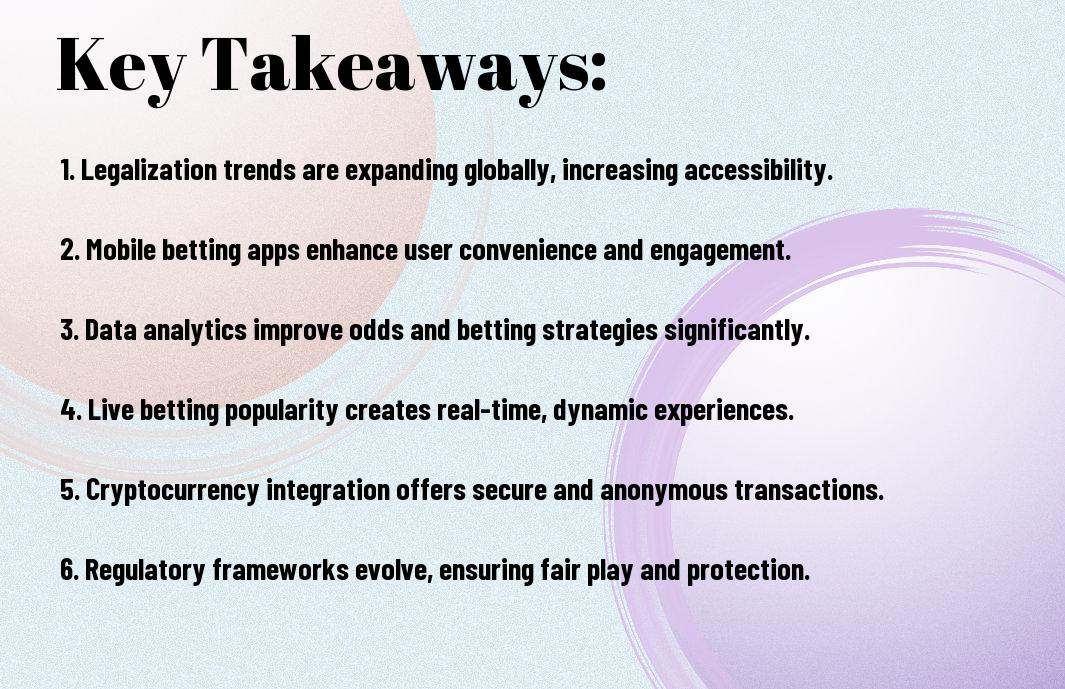As you explore the world of betting, you’ll notice that the industry has undergone significant transformations over the years. Your understanding of betting systems will help you appreciate the impact of these changes. You can see how advancements in technology have revolutionized the way you place bets, access information, and interact with other bettors. This shift has opened up new opportunities for you to make informed decisions and enhance your overall betting experience. You will discover how these developments have shaped the betting landscape.
Key Takeaways:
- The introduction of online betting platforms has significantly expanded the scope of betting, allowing users to place bets from anywhere in the world and at any time, increasing accessibility and convenience.
- Advanced betting systems have enabled the use of data analytics and algorithms to predict outcomes, giving bettors a more informed edge and changing the way they approach wagering.
- The rise of mobile betting has further transformed the industry, with the majority of bets now being placed through mobile devices, highlighting the importance of user-friendly and responsive mobile applications.
- The development of new betting products, such as live betting and esports betting, has attracted a new demographic of bettors and increased engagement among existing ones, driving growth and innovation in the industry.
- The integration of artificial intelligence and machine learning into betting systems is expected to continue shaping the future of betting, with potential applications including personalized betting recommendations and enhanced fraud detection.

Early Betting Systems
While exploring the history of betting, you’ll discover that early systems laid the groundwork for modern betting. These systems were often simple, yet effective, and allowed you to place bets with relative ease.
Traditional Bookmaking Methods
Typically, traditional bookmaking methods involved a physical presence, where you would visit a bookmaker to place your bets. This method was widely used and allowed you to interact with the bookmaker directly, giving you a sense of security and trust in your transactions.
Street Betting Operations
The street betting operations were often run by local bookmakers, where you could place bets on various events, from sports to horse racing. These operations were usually informal and allowed you to bet with cash, giving you a sense of excitement and immediacy.
But as you investigate deeper into the world of street betting operations, you’ll find that they were not without their risks. You had to be careful when placing bets, as some bookmakers were not always trustworthy, and you could easily lose your money if you weren’t careful. Despite these risks, street betting operations remained popular, and you can still see remnants of them in modern betting systems today.
Technology Revolution
It was inevitable that technology would play a significant role in the evolution of betting, and as you explore this era, you’ll notice how systems changed the game forever, transforming the way you place bets and interact with bookmakers.
Digital Platforms
Revamping the betting landscape, online platforms emerged, offering you a convenient and accessible way to bet from the comfort of your own home, and as you examined into this new world, you discovered a plethora of options and opportunities.
Mobile Integration
Following the rise of digital platforms, you’ll find that mobile integration took betting to the next level, allowing you to bet on-the-go, and as you became accustomed to this new flexibility, your betting habits likely changed significantly.
Digital advancements in mobile integration have enabled you to access a wide range of betting options, from sports to casino games, all at your fingertips, and as you continue to navigate this space, you’ll notice how your mobile device has become an necessary tool for placing bets and staying up-to-date with the latest odds and offers.

Data Analytics Impact
After the introduction of data analytics, the betting landscape underwent a significant transformation, allowing you to make more informed decisions and gain a competitive edge. You can now access vast amounts of data, enabling you to analyze trends, patterns, and probabilities, which in turn, helps you to refine your betting strategy.
Predictive Modeling
Above all, predictive modeling has revolutionized the way you approach betting, enabling you to forecast outcomes with greater accuracy. You can use statistical models to identify potential winners, anticipate upsets, and make data-driven decisions, giving you a significant advantage over traditional betting methods.
Real-time Odds Adjustment
Behind the scenes, real-time odds adjustment has become a key factor in modern betting, allowing you to respond quickly to changing circumstances. You can now adjust your bets in real-time, taking into account shifting odds, injuries, and other factors that may impact the outcome of an event.
Due to the advent of real-time odds adjustment, you can now capitalize on fleeting opportunities and minimize potential losses. You can monitor the odds in real-time, identifying areas where the odds are shifting in your favor, and adjust your bets accordingly, giving you a level of flexibility and control that was previously unimaginable, and enabling you to optimize your betting strategy for maximum returns.
Modern Betting Innovations
Keep in mind that modern betting innovations have transformed the industry, and you can learn more about its history by visiting Across the Ages: How Betting Shaped and Was Shaped by Technology – NSoft. This resource provides valuable insights into the evolution of betting.
Live Betting Features
By exploring live betting features, you’ll discover a new level of engagement, allowing you to place bets in real-time, enhancing your overall experience.
Artificial Intelligence Systems
Between the lines of code, artificial intelligence systems are revolutionizing the betting industry, enabling more accurate predictions and personalized recommendations for you.
Due to the advancements in artificial intelligence, you can now access more sophisticated betting platforms, offering you data-driven insights and tailored suggestions to inform your betting decisions, ultimately enhancing your chances of success.
Regulatory Evolution
Many developments have shaped the betting industry, and you will notice that regulations have played a significant role in this transformation. As you explore the history of betting, you will see that regulatory changes have had a profound impact on the industry’s growth and development.
Legal Framework Changes
Against the backdrop of evolving societal norms, you will find that changes in legal frameworks have been instrumental in shaping the betting industry. As you examine deeper, you will discover that these changes have enabled the industry to expand and become more mainstream.
Compliance Technologies
Above all, you should consider the role of compliance technologies in ensuring that betting operators adhere to regulatory requirements. As you examine the industry more closely, you will see that these technologies have become crucial for maintaining the integrity of betting systems.
Evolution of compliance technologies has been significant, and you will notice that it has enabled betting operators to implement more effective measures to prevent fraud and ensure fair play. As you explore the various compliance technologies available, you will discover that they provide you with a range of tools to monitor and manage betting activities, allowing you to make more informed decisions about your betting practices.
Market Transformation
All aspects of the betting industry have undergone significant changes with the introduction of new systems, allowing you to access a wide range of markets and betting options. This transformation has opened up new opportunities for you to engage with the industry in ways that were previously not possible.
Global Accessibility
The rise of online betting platforms has enabled you to access markets from all over the world, providing you with a broader range of options and opportunities to place bets. This increased accessibility has made it easier for you to participate in the betting industry, regardless of your location.
User Experience Changes
Beside the changes in market accessibility, the user experience has also undergone significant transformations, allowing you to interact with betting platforms in a more intuitive and user-friendly way. You can now easily navigate through various betting options and manage your accounts with ease.
Also, as you explore the user experience changes, you will notice that many betting platforms now offer personalized recommendations and tailored promotions, making your betting experience more engaging and enjoyable. You can take advantage of these features to make informed decisions and enhance your overall betting experience.
Final Words
So, as you reflect on the evolution of betting, you see how systems have transformed the game. You now have access to advanced tools and strategies, enabling you to make informed decisions. Your understanding of the betting landscape has expanded, and you can navigate the complex world of betting with confidence. You are equipped to explore new opportunities and maximize your potential in this ever-changing environment.
FAQ
Q: What is the significance of the evolution of betting systems in the gaming industry?
A: The evolution of betting systems has revolutionized the gaming industry by introducing innovative technologies, enhancing user experience, and providing a wide range of betting options. Traditional betting systems have been replaced by advanced online platforms, mobile apps, and artificial intelligence-powered tools, making it easier for players to place bets and access various games. This transformation has not only increased the popularity of betting but also led to the development of new business models, creating new revenue streams for the industry.
Q: How have betting systems changed the way people engage with sports and games?
A: The advancement of betting systems has significantly changed the way people engage with sports and games. With the rise of online betting, fans can now place bets in real-time, creating a more immersive experience. Additionally, the availability of in-play betting, live streaming, and data analytics has enabled players to make informed decisions, increasing their participation and enthusiasm. Furthermore, social media integration and online communities have facilitated discussions, tips, and advice-sharing among bettors, fostering a sense of camaraderie and shared interest.
Q: What role do modern betting systems play in ensuring fair play and responsible gaming practices?
A: Modern betting systems play a vital role in promoting fair play and responsible gaming practices. Advanced technologies, such as AI-powered monitoring tools and machine learning algorithms, help detect and prevent fraudulent activities, ensuring the integrity of games and protecting players from exploitation. Moreover, many betting platforms now offer features like deposit limits, self-exclusion options, and reality checks, enabling players to manage their gaming habits and make informed decisions about their betting activities. Regulatory bodies and industry organizations also work closely with betting operators to establish and enforce strict guidelines, promoting a safe and responsible gaming environment.






